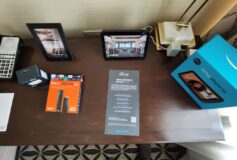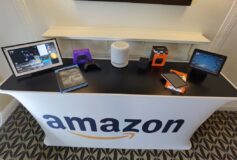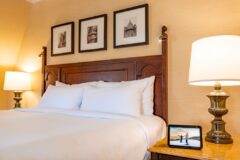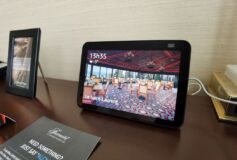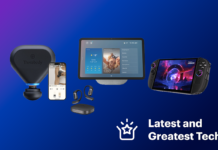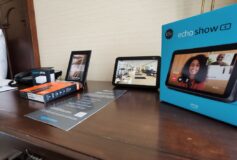
Amazon announces the launch of Alexa Smart Properties for Hospitality in Canada. This brings the voice assistant experience into hotel rooms. The Fairmont Le Manoir Richelieu located in Charlevoix, Quebec is the first Fairmont property in the world, and the first hotel in Canada, to integrate Alexa Smart Properties for Hospitality.
With this service, hotel guests have an Amazon Echo smart speaker on standby to answer a variety of questions that would normally be done by the front desk. Let’s take a look at this new feature, the benefits it offers for travellers, and how to use Alexa as a personal concierge at home, and away.
Bringing the smart home experience to hotel rooms
We all know that smart homes are powered by smart speakers ad smart displays. The same logic holds true in hotel rooms. Alexa Smart Properties for Hospitality uses a variety of Amazon Echo Dot and Echo Show devices to bring the voice assistant experience into hotel rooms. This includes the Amazon Echo Dot, the Echo Show 8, and the Echo Show 15.
Hotels can choose which devices they want in the room. From there, it uses a software-based deployment and management system on the back-end. This provides hoteliers the option of managing devices from a central console. For guests, the front-end experience will feel identical to the Alexa experience they have at home.
Integrating Alexa Skills to manage guest experiences
Alexa Skills function like apps. Through the voice interface, Alexa gives users a hands-free way to interact with skills. For example, at home, users can use their voice to check the news, listen to music, or play a game.
Hoteliers can create and enable tens of thousands of Alexa skills to enhance the guest experience. Control the default music station, control the max volume, and provide specific context-relevant help. This provides the option to customize the voice experience. For example, if a hotel has a spa, they can create a skill to allows guests to book appointments via voice. Another example is allowing guests to order room service, or providing guests with the Wi-Fi password.
Knowing what to ask Alexa
Guests may be unsure what skills can help them during their stay. Hotels can provide guests with a pamphlet of suggested commands to use. This can range from playing music and setting alarms, to booking hotel services such as spa treatments. From there, guests can experiment and ask Alexa additional things like retrieving weather information, or finding local attractions nearby.
Respecting guest privacy
Alexa Smart Properties for Hospitality is designed to respect privacy, customer data, and security. All guest interactions with Alexa are anonymous. That means no data links an individual guest with their interaction. Furthermore, all voice recordings are deleted daily.
Nevertheless, hotels can acquire anonymous data that can help them improve the guest experience. For example, through guest interactions with Alexa, hotels may find that guests routinely ask for extra towels. This information may help them decide to include extra towels in each room.
By default, hotel guests must opt-in to use voice assistants in their room. The microphone is muted by default on the Echo devices. This opt-in strategy ensures guest privacy is respected from check-in.
Who benefits from using Alexa in hotel rooms?
As more and more people embrace smart homes, they will expect the same experience during travel. For example, if you use an Echo device at home to set a morning alarm, you’ll want that same experience in a hotel room. Furthermore, if you listen to the news in the morning, you’ll also have the same experience. With custom skills, hotels can take it a step further and allow guests to order coffee, or book a spa treatment.
For others, this may be their first Alexa experience. After interacting with Echo devices in a hotel room—and realizing the power of having a virtual concierge—they may decide to get one for their home. This experience makes a great introduction on the benefits of a smart home. As users integrate more devices like smart plugs, and smart lights—they slowly build a smart home from the ground up.
What is it like to use Alexa in a hotel?
I had the opportunity to stay in the Fairmont Le Manoir Richelieu and be one of the first Canadians to experience Alexa in a hotel room. As a smart home owner and someone who uses voice assistants everyday, I felt right at home. I’m also a creature of habit and I didn’t have to switch my nighttime and morning routine while travelling.
Before bed, I set a morning alarm for 6:30am. When I woke up, Alexa provided the weather forecast. Since I had some free time, I asked for the location of the Wellness Center. I was provided with clear directions to the hot tub. This is an example of an Alexa Skill developed in partnership the Fairmont and Amazon. In a few short years, I predict voice assistants will be commonplace in hotels. It’s a quick way for guests to get information during their stay. Conversely, hotels can push information onto the display to promote offers and amenities throughout the year.
The one thing that I really liked about the experience is that guests have to opt-in. If you don’t want to use a voice assistant, you don’t have too. If you do, you’re required to manually turn the mic on. In addition, I learned the front camera on Echo Show smart displays was disabled. That means people don’t have to have any privacy worries with an Echo device in their hotel room.
A personal concierge at home and away
Often people just need to use Alexa once to understand the power and utility of smart speakers and smart displays. Alexa Smart Properties for Hospitality provides an opportunity for people to experience voice assistants first-hand. If you already use an Echo device, you’ll feel right at home. If it’s your first experience, you’ll want to get an Echo and bring that experience home.
During travel or at home, Alexa is your personal concierge ready and waiting to help. Check out this all these Amazon products to learn how you can use Alexa at home as your personal concierge.

